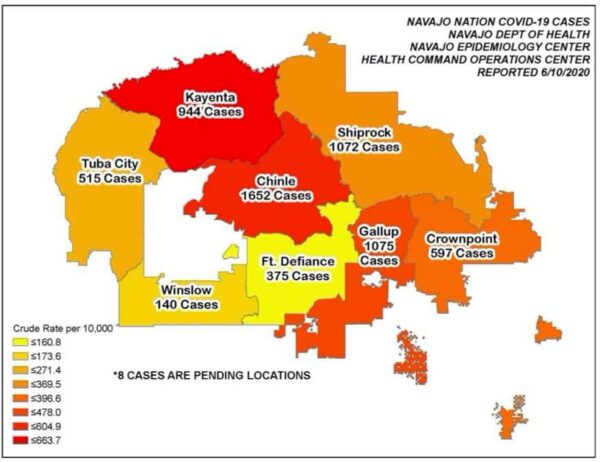
- Details
- By Native News Online Staff
WINDOW ROCK, Ariz. — On Thursday, the Navajo Department of Health, in coordination with the Navajo Epidemiology Center and the Navajo Area Indian Health Service, reported 103 new cases of COVID-19 for the Navajo Nation and six more deaths. The total number of deaths has reached 298 as of Thursday. Reports from 11 health care facilities indicate that approximately 3,063 individuals have recovered from COVID-19, with one health care facility report still pending.
42,341 people have been tested for COVID-19, which represents 20.6-percent of the Navajo Nation’s population. The total number of positive COVID-19 cases for the Navajo Nation has reached 6,378.
Navajo Nation cases by Service Unit:
- Chinle Service Unit: 1,652
- Crownpoint Service Unit: 597
- Ft. Defiance Service Unit: 375
- Gallup Service Unit: 1,075
- Kayenta Service Unit: 944
- Shiprock Service Unit: 1,072
- Tuba City Service Unit: 515
- Winslow Service Unit: 140
* Eight residences are not specific enough to place them accurately in a Service Unit
Navajo Nation President Jonathan Nez and Vice President Myron Lizer continue to urge Navajo citizens to remain home as much as possible to avoid another spike in new cases, especially as other areas in the state of Arizona continue to see daily increases in new cases.
"Today, the Governor of Arizona assured our state’s citizens that the health care system is ready and prepared for the surge of new COVID-19 cases. For the Navajo Nation, we do not want to have to implement surge plans because we do not want a second wave of COVID-19. A second wave would devastate the Navajo Nation’s health care system and risk the lives of even more of our elders and high-risk citizens. So, let’s be smart and make good decisions for ourselves and our loved ones," President Nez said.
President Nez and Vice President Lizer will host another online town hall on Friday at 10:00 a.m. (MDT) to provide more updates on COVID-19 and the 2020 Census Count on the Navajo Nation.
To Donate to the Navajo Nation
The official webpage for donations to the Navajo Nation, which has further details on how to support the Nation’s Dikos Ntsaaígíí-19 (COVID-19) efforts is: http://www.nndoh.org/donate.html.
For More Information
For more information including reports, helpful prevention tips, and more resources, please visit the Navajo Department of Health’s COVID-19 website at http://www.ndoh.navajo-nsn.
For up to date information on impact the coronavirus pandemic is having in the United States and around the world go to: https://www.worldometers.info/coronavirus/country/us/?fbclid=IwAR1vxfcHfMBnmTFm6hBICQcdbV5aRnMimeP3hVYHdlxJtFWdKF80VV8iHgE
For up-to-date information about COVID-19, Native News Online encourages you to go to Indian Health Service’s COVID-19 webpage and review CDC’s COVID-19
More Stories Like This
Native News Weekly (August 25, 2024): D.C. BriefsUS Presidents in Their Own Words Concerning American Indians
NDAA passes House; Lumbee Fairness Act Advances
NFL, Vikings to Host Native All-American Game, Youth Flag Clinic
Senate Committee on Indian Affairs Passes 12 Bills to Strengthen Tribal Communities
Help us defend tribal sovereignty.
At Native News Online, our mission is rooted in telling the stories that strengthen sovereignty and uplift Indigenous voices — not just at year’s end, but every single day.
Because of your generosity last year, we were able to keep our reporters on the ground in tribal communities, at national gatherings and in the halls of Congress — covering the issues that matter most to Indian Country: sovereignty, culture, education, health and economic opportunity.
That support sustained us through a tough year in 2025. Now, as we look to the year ahead, we need your help right now to ensure warrior journalism remains strong — reporting that defends tribal sovereignty, amplifies Native truth, and holds power accountable.
 The stakes couldn't be higher. Your support keeps Native voices heard, Native stories told and Native sovereignty defended.
The stakes couldn't be higher. Your support keeps Native voices heard, Native stories told and Native sovereignty defended.
Stand with Warrior Journalism today.
Levi Rickert (Potawatomi), Editor & Publisher

